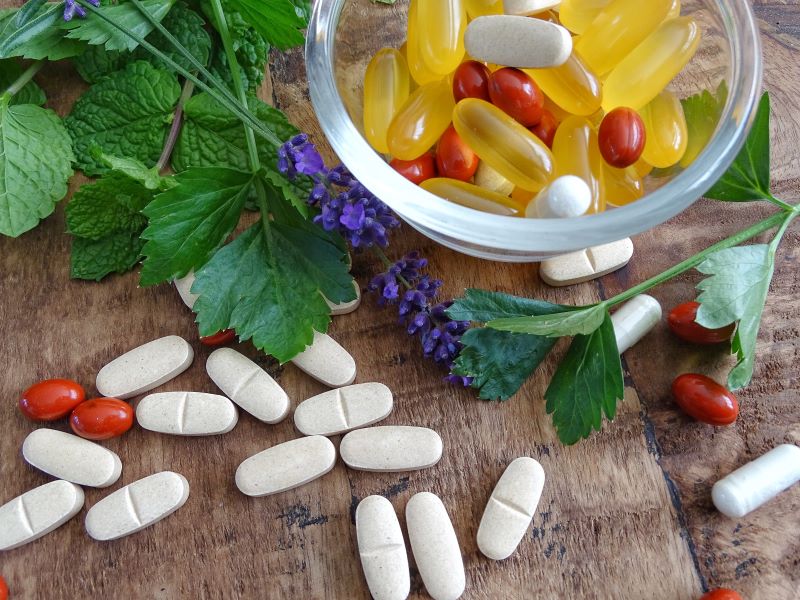What is Vitamin Toxicity & Causes of Consuming Too Much Vitamin

In our pursuit of good health, vitamins are often the go-to solution, but too much can be dangerous. Vitamin toxicity, or hypervitaminosis, is a condition where there is an excessive intake of vitamins over what the body requires, with adverse effects.
This article will examine the causes, symptoms, and treatments of vitamin toxicity to help you weigh the pros and cons of taking vitamins.

Table of Contents

What is Vitamin Toxicity?

Hypervitaminosis, or vitamin toxicity, occurs when vitamin levels exceed their recommended limits, resulting in negative health effects. This often results from too much use of supplements rather than food sources.
Fat-soluble vitamins (A, D, E, and K) are more likely to cause toxicity since they can accumulate within our bodies' tissues.
From mild forms, such as headaches and nausea, to extreme ones, including organ failure, its symptom spans the whole spectrum of severity. Knowing about vitamin toxicity helps guarantee safety and effectiveness when using multivitamins.
Causes of Vitamin Toxicity

Vitamin toxicity occurs when an excess of vitamins is ingested beyond the body’s needs and its ability to utilise, leading to adverse effects. Multiple factors contribute to this condition, usually related to how vitamins are consumed and controlled. Here are the primary reasons for vitamin toxicity:
1. Excessive Supplementation
Overdosing on vitamin pills, especially without medical advice, may be toxic. This is the major cause.
2. Foods with Additives
Intake of large quantities of foods enhanced with nutrients sets up a possible scene for excessive consumption.
3. Lack of Information
Failure to understand recommended dietary allowances (RDAs) or safe upper limits (SULs) can result in excessive intake.
4. Certain Medical Conditions
Sicknesses such as liver or kidney diseases that interfere with vitamin metabolism or storage could increase the risk of toxicity.
5. Fat-Soluble Vitamins
The fatty tissues and liver store fat-soluble vitamins, e.g., A, D, E, K, more easily than their water-soluble counterparts; hence, they accumulate at toxic levels swiftly.
6. Multiple Supplements
Taking multiple supplements that contain the same vitamin can lead to accidental overdose.
Symptoms of Vitamin Toxicity
Vitamin toxicity leads to various consequences, but a few of the major symptoms to identify vitamin toxicity are as follows:
1. Frequent and Cloudy Urination
This may suggest that the kidneys cannot filter waste products from the blood due to high levels of some vitamins.
2. Irritation of Eyes (Conjunctivitis)
An overdose of vitamins can irritate the eye tissues, making them red, itchy, and burning.
3. Photophobia
As your eyes become more sensitive to bright light, you might feel uncomfortable under such circumstances because of excessive vitamins.
4. Palpitations
Rapid or irregular heartbeats. Sometimes, vitamin toxicity affects electrical signals in the heart, causing a racing heart or skipped beats.
5. Joint Pain
Joint and bone pain occurs when someone consumes an excess of vitamins, which strains his bones and joints, causing stiffness and pain.
6. Arthralgia
Muscle aches or weak muscles could indicate excessive intake of certain vitamins, which harm muscular tissues.
7. Mood Swings
They occur when one gets poisoned by vitamins, making it difficult for the nervous system to function properly, leading to other symptoms like irritability and confusion.
8. Convulsions
In worse cases, excessive intake of vitamins can cause seizures, causing abnormal body movements and unconsciousness.
9. Fatigue
Vitamin toxicity can drain away all your strength, leaving you worn out and unable to perform regularly.
10. Headache
Headaches are a common symptom of many diseases, including vitamin toxicity.
11. Flushing of the Skin
Excessive amounts of specific vitamins, especially niacin (vitamin B3), can make the blood vessels on your skin wide open, hence the appearance of red.
12. Abnormality in the Skin
Vitamin overdose will present differently on the skin, such as rashes, drynesses, peels and yellowing.
13. Changes in Hair Texture
High levels of specific vitamins may lead to breakage, making hair weak, thin, or fall off easily.
14. Anorexia
When vitamin poisoning occurs, it interferes with your liking for food, thus making you lose interest and even feel sick when food is mentioned.
15. Constipation
Constipation could have different causes, but a higher amount of vitamins in one’s body could also cause difficulties passing stool.
16. Diarrhoea
Diarrhoea may also be a symptom of vitamin toxicity because the body tries to remove excess vitamins through the digestive system.
17. Moderate Weight Loss
Unexplained weight loss and other symptoms could indicate vitamin poisoning.
Side Effects of Vitamin Overdose

Hypervitaminosis, an overdose of vitamins, can lead to different side effects depending on the type of vitamin and the intensity at which it is taken. Some possible side effects are listed below according to their vitamin types.
Fat-Soluble Vitamins Overdose
Overconsumption of fat-soluble vitamins such as vitamins A, D, E, and K can lead to toxicity since these vitamins are stored in the body's tissues.
| Fat Soluble Vitamins | Side Effects of Overdose |
| Vitamin A | Acute Toxicity: Nausea, headache, dizziness and muscle ache. Chronic Toxicity: Liver damage, fuzzy vision, bone pain or skin changes such as peeling or itching. |
| Vitamin D | Hypercalcemia: High blood calcium levels, which are characterised by nausea, vomiting, weakness and kidney stones. Bone Pain: It can cause pain due to excessive calcium deposition in bones. Kidney Damage: Caused by high blood calcium levels and possible calcification of the kidneys. |
| Vitamin E | Increased Bleeding: This is brought about by interfering with blood clotting mechanisms, hence increasing the risk for bleeding, especially hemorrhagic stroke. |
| Vitamin K | Reduced Effectiveness of Anticoagulants: Overconsumption of vitamin K may render anticoagulants useless, increasing clotting risks. |
Water-Soluble Vitamins Overdose
Although overconsumption of water-soluble vitamins is less common, it may still lead to adverse effects as these vitamins, such as vitamin B complex and C, are easily excreted.
| Water- Soluble Vitamins | Side Effects of Overdose |
| Vitamin C | Diarrhoea and Nausea: Excessive doses could bring about gastrointestinal problems like diarrhoea and nausea. Kidney Stones: Too much vitamin C increases oxalate production, forming kidney stones. |
| Vitamin B Complex | Thiamine(Vitamin B1): Rarely toxic, but very large doses can result in headaches, irritation and increased heart rate. Riboflavin (Vitamin B2): Generally safe; however, high amounts may cause bright yellow urine and gastrointestinal upset. Niacin (Vitamin B3): Redness, itching, sickness, ruined liver and higher blood sugar levels. Pyridoxine (Vitamin B6): Numbness and difficulty in walking that arises from damage to nerves. Folate (Vitamin B9): Tends to hide signs of deficiency when given excessively in the body. Cobalamin (Vitamin B12): Generally safe but high doses can rarely cause acne or rosacea. |
Who is at Risk of Having Vitamin Toxicity?

Certain people are at the most risk of developing vitamin toxicity. Those are as follows:
High-Dose Supplement Takers
This is the main reason for vitamin poisoning. Vitamins are important nutrients, but taking too many can be dangerous. Always follow dosage instructions and consult with your doctor before using new supplements.
Children
They have a higher risk of developing vitamin poisoning than adults since they are smaller and require fewer vitamins. Ensure that all supplements are kept out of reach of children, and if possible use child-resistant containers.
Pregnant and Nursing Mothers
Some vitamins could cause harm to an unborn baby. Pregnant and lactating women should only take prenatal multivitamins recommended by their physician.
People with Certain Ailments
Vitamin absorption and bioavailability may differ depending on the underlying health conditions. If you have any medical issues, consult your healthcare provider before starting any supplementation.
Individuals on Specific Drugs
Vitamins can interact negatively with some medications, leading to toxicity. The doctor should know every supplement or medication taken to avoid drug-nutrient interactions.
Those Who Consume a Fortified Diet
Many foods are enriched with vitamins and minerals. However, your risk will increase if you consume high-dose supplements in addition to eating a balanced diet with fortified foods.
Secure Your Health with These Plans
How to Diagnose Vitamin Toxicity?
A medical professional might recommend you do one of the following tests to diagnose vitamin toxicity:
Skeletal radiography
Hand radiography
Helical CT scanning and urography
CT scan of the brain
KUB (kidney, ureters, bladder) film
Bone mineral density test
Electrocardiography
What are the Treatments for Vitamin Toxicity?
Treatment for vitamin toxicity is usually supportive and symptomatic. Gastrointestinal decontamination can be beneficial to reduce the amount of vitamin absorption. In case of acute overdoses, use charcoal to treat the issue. Antidiarrheals and antiemetics can be useful if needed.
Individuals with severe symptoms of vitamin A toxicity might need medications such as mannitol and diuretics. Furthermore, patients with vitamin D toxicity and severe hypercalcemia might need hydration, steroids, diuretics, mithramycin or calcitonin to treat the condition.
Nevertheless, avoid consuming more than the recommended amounts of vitamins in your diet and through supplements. This measure acts as prevention for vitamin toxicity. If the symptoms do not reduce after reducing the vitamin intake, consult your doctor to plan for the diagnosis and treatment.
Useful Tools to Track Your Health










